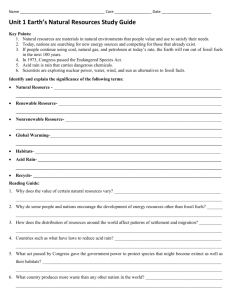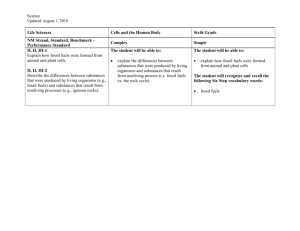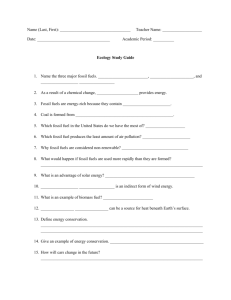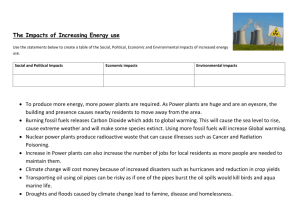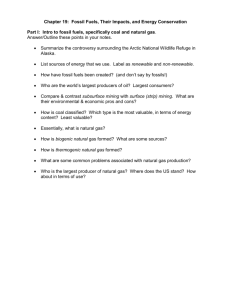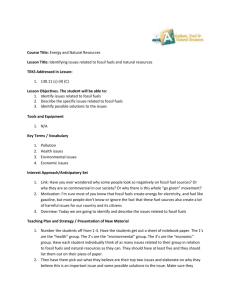ACTION BENEFITS COSTS Buy Local & Organic fossil fuels, air, , H
advertisement
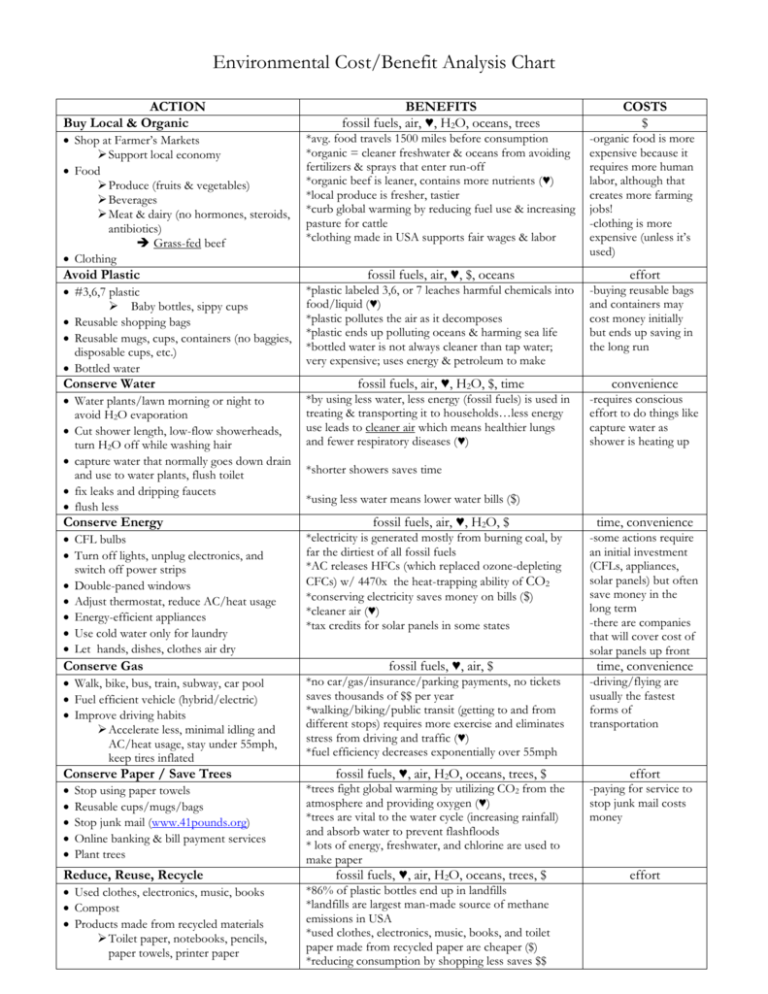
Environmental Cost/Benefit Analysis Chart ACTION Buy Local & Organic Shop at Farmer’s Markets Support local economy Food Produce (fruits & vegetables) Beverages Meat & dairy (no hormones, steroids, antibiotics) Grass-fed beef Clothing Avoid Plastic #3,6,7 plastic Baby bottles, sippy cups Reusable shopping bags Reusable mugs, cups, containers (no baggies, disposable cups, etc.) Bottled water Conserve Water Water plants/lawn morning or night to avoid H2O evaporation Cut shower length, low-flow showerheads, turn H2O off while washing hair capture water that normally goes down drain and use to water plants, flush toilet fix leaks and dripping faucets flush less Conserve Energy CFL bulbs Turn off lights, unplug electronics, and switch off power strips Double-paned windows Adjust thermostat, reduce AC/heat usage Energy-efficient appliances Use cold water only for laundry Let hands, dishes, clothes air dry Conserve Gas Walk, bike, bus, train, subway, car pool Fuel efficient vehicle (hybrid/electric) Improve driving habits Accelerate less, minimal idling and AC/heat usage, stay under 55mph, keep tires inflated Conserve Paper / Save Trees Stop using paper towels Reusable cups/mugs/bags Stop junk mail (www.41pounds.org) Online banking & bill payment services Plant trees Reduce, Reuse, Recycle Used clothes, electronics, music, books Compost Products made from recycled materials Toilet paper, notebooks, pencils, paper towels, printer paper BENEFITS fossil fuels, air, ♥, H2O, oceans, trees COSTS $ *avg. food travels 1500 miles before consumption *organic = cleaner freshwater & oceans from avoiding fertilizers & sprays that enter run-off *organic beef is leaner, contains more nutrients (♥) *local produce is fresher, tastier *curb global warming by reducing fuel use & increasing pasture for cattle *clothing made in USA supports fair wages & labor -organic food is more expensive because it requires more human labor, although that creates more farming jobs! -clothing is more expensive (unless it’s used) fossil fuels, air, ♥, $, oceans effort *plastic labeled 3,6, or 7 leaches harmful chemicals into food/liquid (♥) *plastic pollutes the air as it decomposes *plastic ends up polluting oceans & harming sea life *bottled water is not always cleaner than tap water; very expensive; uses energy & petroleum to make -buying reusable bags and containers may cost money initially but ends up saving in the long run fossil fuels, air, ♥, H2O, $, time convenience *by using less water, less energy (fossil fuels) is used in treating & transporting it to households…less energy use leads to cleaner air which means healthier lungs and fewer respiratory diseases (♥) -requires conscious effort to do things like capture water as shower is heating up *shorter showers saves time *using less water means lower water bills ($) fossil fuels, air, ♥, H2O, $ *electricity is generated mostly from burning coal, by far the dirtiest of all fossil fuels *AC releases HFCs (which replaced ozone-depleting CFCs) w/ 4470x the heat-trapping ability of CO2 *conserving electricity saves money on bills ($) *cleaner air (♥) *tax credits for solar panels in some states fossil fuels, ♥, air, $ *no car/gas/insurance/parking payments, no tickets saves thousands of $$ per year *walking/biking/public transit (getting to and from different stops) requires more exercise and eliminates stress from driving and traffic (♥) *fuel efficiency decreases exponentially over 55mph fossil fuels, ♥, air, H2O, oceans, trees, $ *trees fight global warming by utilizing CO2 from the atmosphere and providing oxygen (♥) *trees are vital to the water cycle (increasing rainfall) and absorb water to prevent flashfloods * lots of energy, freshwater, and chlorine are used to make paper fossil fuels, ♥, air, H2O, oceans, trees, $ *86% of plastic bottles end up in landfills *landfills are largest man-made source of methane emissions in USA *used clothes, electronics, music, books, and toilet paper made from recycled paper are cheaper ($) *reducing consumption by shopping less saves $$ time, convenience -some actions require an initial investment (CFLs, appliances, solar panels) but often save money in the long term -there are companies that will cover cost of solar panels up front time, convenience -driving/flying are usually the fastest forms of transportation effort -paying for service to stop junk mail costs money effort Environmental Journal Guidelines Every Friday you will create a journal entry in which you record your impact on the environment for that week. Major topics to think of are global warming, pollution, deforestation, recycling, water conservation, organic and local food and clothing, energy conservation, and alternative energy sources. You should consult your “Environmental Cost/Benefit Analysis Chart” for ideas on things you could start or stop doing to benefit the environment. Questions to keep in mind when writing your journal entry: What could you do to improve your impact on the environment or reduce your “carbon footprint?” What actions did you take that would be considered “green?” What did you do that is only adding to the problem? Did you read any books or articles related to environmental challenges or solutions being proposed? Did you watch anything on the Internet or on TV that mentioned or focused on the environment and conservation? Did you have a conversation with anyone to spread the word or learn something new? How strongly do you feel about the impending threat to humanity posed by the exploitation and destruction of our land, water, and air?

